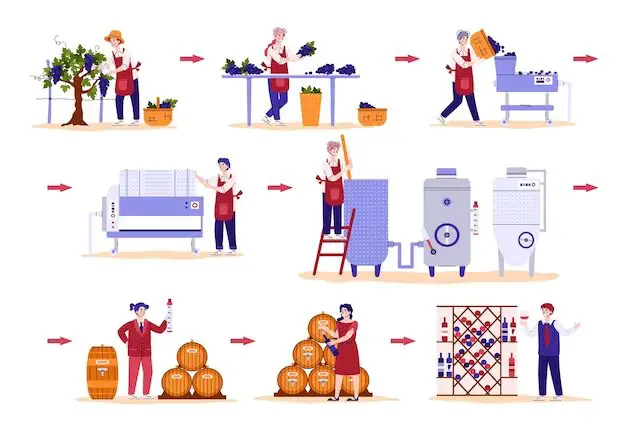Household Mode of Production
Introduction
In a world dominated by traditional economic models, the household mode of production stands as a beacon of empowerment and sustainability. This alternative approach challenges the status quo by emphasizing self-reliance, community cooperation, and ecological harmony.
In this article, we delve into the merits of the exploring its potential to revolutionize our lives and create a brighter future for individuals and communities alike.
Read it Also: Household Items List
Rediscovering Self-Sufficiency

Unleashing Creativity
Embracing the household mode of production allows individuals to tap into their creative potential. By producing goods and services within the comfort of our homes, we gain the freedom to explore our passions, experiment with new ideas, and create unique products that reflect our true selves.
Reducing Reliance on Consumerism
In a world inundated with mass-produced goods, the offers a refreshing alternative. By producing essential items locally, we reduce our dependence on consumerism and contribute to a more sustainable and resilient economy.
Rediscovering Traditional Skills
In a society dominated by specialized professions, we have lost touch with the practical skills that our ancestors possessed. Embracing the household mode of production allows us to reconnect with our roots and learn essential skills like gardening, cooking, sewing, and carpentry. By cultivating these abilities, we become more self-sufficient, reducing reliance on external systems and regaining control over our lives.
Empowering Sustainable Practices
The household mode of production promotes sustainability by encouraging practices such as organic gardening, composting, and energy conservation. We can minimize waste, decrease our carbon footprint, and contribute to a healthier environment by taking responsibility for our resources. These sustainable practices benefit our immediate surroundings and serve as a powerful example for others to follow.
Fostering Community Cooperation

Strengthening Social Bonds
Engaging in the household mode of production fosters a sense of camaraderie and cooperation within communities. Through shared resources, knowledge exchange, and collaborative projects, individuals come together to support one another, creating stronger social ties and a more profound sense of belonging.
Empowering Local Economies
We empower local economies by shifting our focus from globalized supply chains to local production. This mode of production promotes entrepreneurship, creates job opportunities, and keeps wealth circulating within communities, leading to more excellent economic stability and prosperity.
Instilling Values and Life Skills
Engaging in the provides an ideal platform for teaching children important values and life skills. We impart lessons of hard work, perseverance, problem-solving, and resourcefulness by involving them in daily chores and projects. These invaluable skills lay the foundation for their personal and professional growth, equipping them with the tools they need to navigate the complexities of life.
Shared Responsibilities
The household mode of production fosters a sense of shared responsibility among family members. By engaging in tasks together, such as meal preparation, cleaning, and childcare, we create opportunities for meaningful interactions and build stronger bonds. Through collaboration and mutual support, we develop a deeper understanding of each other’s strengths and weaknesses, fostering a harmonious and resilient family unit.
Read it Also: Mixing Lysol and Bleach
Promoting Ecological Harmony

Sustainable Resource Management
The household mode of production encourages responsible resource management. By embracing recycling, upcycling, and utilizing renewable energy sources, we minimize waste and reduce our carbon footprint, contributing to a healthier and more sustainable planet.
Nurturing Nature-Centric Lifestyles
Through the we reconnect with nature and develop lifestyles that prioritize environmental stewardship. From organic gardening and permaculture to sustainable energy systems and mindful consumption, we create a harmonious relationship with the natural world, promoting biodiversity and ecological resilience.
Embracing Creativity and Fulfillment

Pursuing Passion Projects
The household mode of production allows individuals to explore and pursue their passions beyond the confines of traditional employment. Whether it’s painting, writing, crafting, or starting a small business, embracing this mode of production creates the freedom to dedicate time and energy to personal creative endeavors. By nurturing our passions, we experience greater fulfillment and purpose in our lives.
Cultivating a Mindful Lifestyle
Engaging in the encourages a mindful and deliberate approach to living. We develop a deeper connection with our surroundings by slowing down and appreciating the present moment, fostering gratitude and contentment. This shift in mindset promotes mental well-being and helps us break free from the constant pressures of consumerism and materialism.
Read it Also: Relaxing Crossword Clue
Household Mode of Production: Top 5 Inspiring Success Stories

Urban Homesteading
Urban homesteading is a modern-day manifestation of the household mode of production. Individuals and families in urban areas are reclaiming small spaces to grow their food, raise backyard chickens, and even produce honey from rooftop beehives. By utilizing available resources within the confines of their homes, urban homesteaders can provide fresh, organic produce for themselves, contribute to local food resilience, and reduce their ecological footprint.
Handmade Artisan Crafts
The resurgence of handmade artisan crafts exemplifies the household mode of production. Artisans, ranging from potters and weavers to woodworkers and jewelry makers, are turning their passion into a livelihood by creating unique, handcrafted products. These artisans often operate from home-based studios, leveraging their skills and creativity to produce one-of-a-kind items that reflect their artistic vision. Through online marketplaces and local craft fairs, they connect directly with consumers who appreciate the value of handmade goods and the stories behind them.
Community Gardens
Community gardens are thriving examples of the household mode of production on a collective scale. These shared spaces bring together individuals from diverse backgrounds, empowering them to collectively cultivate their own plots of land. Community gardeners grow various fruits, vegetables, and herbs by pooling resources, knowledge, and labor. These gardens provide fresh, locally grown produce and foster a sense of community, shared responsibility, and sustainable practices.
Homemade Goods and Small-Scale Production
The rise of homemade goods and small-scale production is another embodiment of the household mode of production. Many have turned their hobbies and passions into small businesses by creating handmade soaps, candles, textiles, or baked goods. They reach a wider audience through online platforms and local markets, offering products crafted with care and attention to detail and often using sustainable and natural materials. These ventures not only provide economic opportunities but also promote the values of authenticity, quality, and supporting local artisans.
Sharing and Bartering Networks
Sharing and bartering networks exemplify the collaborative spirit of the household mode of production. Online platforms and local communities facilitate the exchange of goods and services among individuals, enabling them to share resources, skills, and time. From tool libraries and clothing swaps to skill-sharing groups and ride-sharing programs, these networks promote community, reduce waste, and foster a more sustainable and interconnected way of living.
Further questions and answers about the Household Mode of Production
Absolutely! While the household mode of production may seem at odds with the fast-paced nature of modern society, it offers a practical and sustainable alternative that can be adapted to our contemporary lifestyles. It is precisely because of the hectic pace of our lives that embracing this mode of production becomes even more critical. Incorporating self-sufficiency, shared responsibilities, and mindful living into our daily routines can reclaim control over our time, reduce stress, and foster a greater sense of balance.
The household mode of production has the potential to impact our economic well-being in various ways positively. By cultivating skills and engaging in productive activities within our households, we can reduce our reliance on external resources and expenses. For example, growing our food, sewing and repairing clothing, or creating homemade products can significantly cut costs. Additionally, embracing the household mode of production allows us to tap into entrepreneurial opportunities, such as selling handmade crafts or homemade goods, which can generate additional income and contribute to our financial stability.
While it’s true that the household mode of production relies on the resources and expertise available within our households, it should not be seen as limiting. On the contrary, it encourages resourcefulness and creativity in maximizing what we have. In today’s interconnected world, we have access to a wealth of information, online tutorials, and communities that can guide and support learning new skills. Moreover, the household mode of production promotes collaboration and sharing within communities, allowing individuals to tap into a collective pool of knowledge and resources, thereby expanding the possibilities for what can be accomplished.
Absolutely! The household mode of production is not about rejecting modern technologies but embracing them thoughtfully and intentionally. Technology can enhance our productivity and efficiency within the household. For instance, we use smart home devices to manage energy consumption, utilize online platforms to connect with like-minded individuals for knowledge sharing or employ digital tools for project management and organization. By harnessing the power of modern technologies, we can streamline processes, optimize resource utilization, and make the household mode of production even more effective and accessible in our everyday lives.
The household mode of production aligns closely with sustainability principles, making it an invaluable tool in shaping a more sustainable future. By reducing reliance on mass-produced goods, we can decrease resource demand, minimize waste, and mitigate the negative environmental impacts of large-scale production. Additionally, the emphasis on self-sufficiency and sustainable practices, such as organic gardening and energy conservation, promotes a greener lifestyle. By adopting the household mode of production, we can collectively contribute to preserving our planet for future generations, fostering a more harmonious relationship between humans and the environment.
Remember, embracing the household mode of production is not about altogether abandoning the conveniences of modern life. It’s about finding a balance and reclaiming our autonomy, creativity, and connection with ourselves, our families, and the world around us. Let us embark on this transformative journey and experience the multitude of benefits it has to offer.
Read it Also: Gluteus Minimus Exercises
Conclusion
The household mode of production represents a transformative paradigm shift, offering individuals and communities an alternative path to empowerment and sustainable living. By embracing self-sufficiency, fostering community cooperation, and promoting ecological harmony, we unlock a world of possibilities that transcend traditional economic models. It is time to break free from the chains of consumerism and embrace a future where creativity, cooperation, and sustainability reign supreme. Embrace the household mode of production and be the change our world needs.



